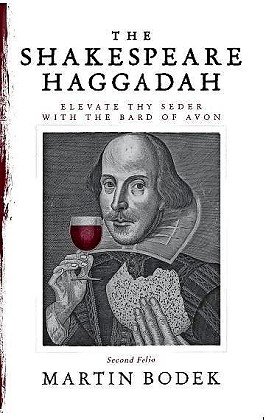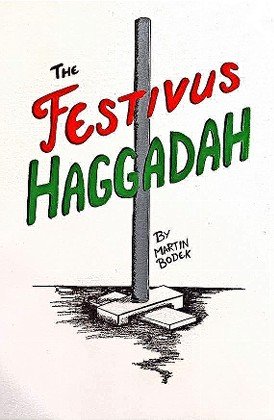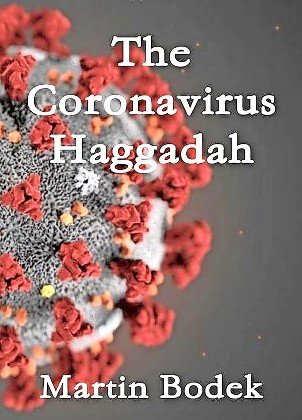Author has Shakespearean twist on Passover
Wherefore is this Haggadah diff’rent from all oth’r Haggadahs?
Martin Bodek, author of the “Emoji Haggadah,” “Festivus Haggadah” and “Coronavirus Haggadah,” has released another version of the Passover story, translated fully into Elizabethan English.
“The Shakespeare Haggadah: Elevate Thy Seder With the Bard of Avon” retells the traditional tale of the Exodus from Egypt with Hebrew on the right side and quotes from, and references to, William Shakespeare’s plays on the left. It’s replete with old English typeface and refers to items on the seder plate as “the bare-picked bone of majesty,” “roasted egg in wrath and fire” and “the enchanted herbs,” referencing King John, Hamlet and The Merchant of Venice, respectively.
Bodek, a self-described pop-culture aficionado and literature fan, says he took every relevant Shakespeare quote he could think of and wove it into the Passover story, creating a “fully-functioning Haggadah.”
“Shakespeare is certainly one of my loves. I can speak Elizabethan English on a dime, if you wish me to. I’m not just selling out, doing it on the cheap. I mean it when I do it,” said Bodek, who quoted from every one of Shakespeare’s 37 plays in this book.
He said he chose to work with the Hagaddah because “it’s the most flexible medium there is” in Jewish text.
“Most other texts or documents are very rigid. They should not be changed or altered or messed with. They’re sacrosanct,” said Bodek. “The commandment that the Haggadah is derived from is simply to remember the Exodus to teach it to your children. It has inherent flexibility.”
Bodek notes that for hundreds of years, Haggadahs were geared to adults and differed only in their interpretations, sects or in how they were transformed into works of art.
In 2017, he and his family were dressed up as emojis for Purim when he said he had a brainstorm and converted a summary of the book of Esther into emojis. He asked himself if it was possible to turn the concept into a full book.
“The Emoji Haggadah was born,” he said. Bodek went on to create the Festivus Haggadah, which is a fusion of Seinfeld tropes. Then, the COVID pandemic hit, and Bodek wrote the Coronavirus Haggadah as “a form of comic relief.”
He says his Shakespeare Haggadah is drawing particular attention from teenagers, which comes as no surprise to Bodek. He told JNS that people tend not to pick up Shakespeare as a child or later in life, but rather in high school and college.
“The Emoji Haggadah had a very funny specific demographic. I learned that 8- to 14-year-old girls love it the most. And I’ve learned that Gen X loves the Festivus Haggadah. People love the Coronavirus Haggadah because it spoke to everyone,” said Bodek. “But the Shakespeare Haggadah specifically targets teenagers, and I think that teenagers are the least marketed-to demographic, at least as far as this goes.”
One of the editorial reviews promoted by the book’s publisher is penned by the Orthodox Union’s Torah content editor, Rabbi Jack Abramowitz.
“It’s absolutely delightful and I may actually use it at the seder this year rather than the Maxwell House Haggados that our ancestors used in the land of Egypt,” Rabbi Abramowitz joked. “At the very least, I will pass it around and encourage people to read some of the English sections aloud. It’s a must for Haggadah collectors and a treat for Shakespeare fans.”
Bodek says he has another two Haggadah concepts in the works already but is consulting with lawyers to determine what he can do parody-wise with some of the bigger pop-culture properties, including Disney and Paramount.
In the meantime, he’s enjoying the early success of his Passover-related endeavors and is expecting more sales as the holiday approaches.
“The compliments that I get are that my Haggadah brought someone’s kid back to the table,” said Bodek. And that’s still the most meaningful thing to hear because that’s pretty much what I’m hoping to accomplish.”











